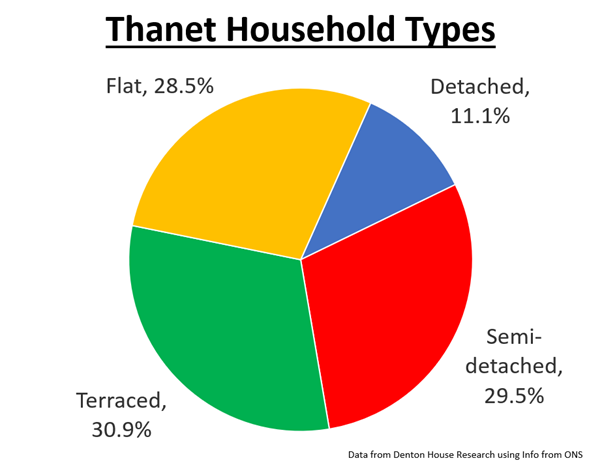What’s the Difference Between a Flat and an Apartment in Thanet?
·
"An apartment is over £100 grand and a
flat under £100k", said my friend.
·
Joking aside, there is no difference, call
it what you will, the humble apartment/flat has served Thanet well over the
years.
·
The average sale price of an apartment in Thanet
in 2021 was £179,994, making it an excellent first-time buyer purchase and
buy-to-let investment.
·
In this article, I want to look at the
apartment/flat in Thanet and how it could solve the county’s housing crisis.
The word ‘Apartment’ derives from the French word ‘Appartement', which
comes from the Italian form of the word, ‘Appartamento’. The core of that
Italian word ‘appartare’ means ‘to separate’, as in ‘separate a building’.
The word comes from Roman times when housing costs were so expensive
within the city walls of Rome. Savvy property owners split (or separated) their
houses into what we know as apartments or flats today.
The word flat is derived from the Old Scottish/Old English word 'flet'.
The flet is the interior of the home. Some also
think the phrase stuck as most flats are on one floor, and so by definition,
the accommodation is on the flat (i.e., no stairs inside).
The country has an enduring housing shortage. Not enough
homes are being built, and even though the Government is aspiring to build
300,000 new homes annually to match demand and keep costs of housing
affordable, less than 250,000 were built in 2019, the best rate in the last
decade.
And that is why some say the simple solution to Britain’s housing
problem is building more apartments/flats.
The British population has been growing by more than half a million every year for the last
twenty years. Yet just over 175,000 homes have been built annually.
One solution is
building more apartments – and on the face of it, the facts stack up as they
are cheaper to heat, the views are often unique and they use less land.
To look at what we
do as a country with our apartments, it's important to look at Europe to see how
they live so that we can compare the percentages of flats/apartments lived in -
· Spain 66.1%
· Switzerland 63.1%
· Greece 59.2%
· Germany 56.3%
· Italy 53.1%
· EU average 46.2%
· Sweden 46.7%
· France 34.0%
· The United Kingdom
14.8%
Quite a stark
difference, isn't it!
Now let’s look at Thanet itself.
Of the 19,264
households in Thanet,
28.5% of them (5,485) are apartments / flats.

Even though only
1.2% of the country has residential property built on it (and an additional
3.5% are gardens), building houses is low-density land use. Is it sustainable
in the long term to continue to build that way in Britain, a country with a
similar population to France yet having less than half its landmass?
If we continue to
build just over 5 in 6 new households as houses, surely sooner or later, the precious
green belt around our towns and cities will have to go. And I know many of you
will say use brownfield sites. Of course, there are brownfield sites, and …
in the whole of the Thanet area, there are 165
brownfield sites, totalling only 112.5 acres, which would provide 2,192 houses.
The country needs a
decent supply of homes for its growing and ageing population. Many of you will
frown when it has been suggested, even if it's for environmental reasons alone,
most of these should be apartments/flats.
Don’t get me wrong,
the love/hate relationship with the apartment/flat and the British is
well-founded. Many apartments/flats in Britain are not suitable for happy family
living. The high-rise ghetto council blocks built in the 1960s didn’t help with
their poor communal areas, lack of maintenance and lifts that didn’t work.
Why do so many more Europeans live in apartments?
In mainland Europe,
the apartments are larger. For example, in Germany, they are 974 sq ft; in
Denmark, they are 1,452 sq. ft; in the UK, they are only 793 sq ft. Also,
European apartment/flat owners have more storage areas, higher ceilings and better
communal areas.
It is a vicious
cycle. Poorly made small apartments make families side-step them, which makes new
home builders construct apartments unsuitable for families, which means the
situation worsens. This results in the British property market trying to expand
our towns and cities outwards into the countryside with houses, rather than upwards
into the sky.
I am not suggesting
20-storey high-rise tower blocks for one second. Looking deeper into the
information from Europe, most people live in low-rise three and four-storey purpose-built
apartment blocks.
To begin with, these
new apartments/flats need to be justly desirable for families and be seen as
such by the local population. The building materials used, communal spaces, the
building’s functionality, and design specifications must not only meet but
exceed current building specs on houses, or planning permission should withhold.
Maybe the
Government could incentivise builders to build apartments/flats instead of
houses to improve the supply of quality apartments/flats with tax breaks?
Things will take
decades to change, yet I thought it was appropriate to discuss the matter in
such an environment as this.
These are my thoughts, what are yours?

